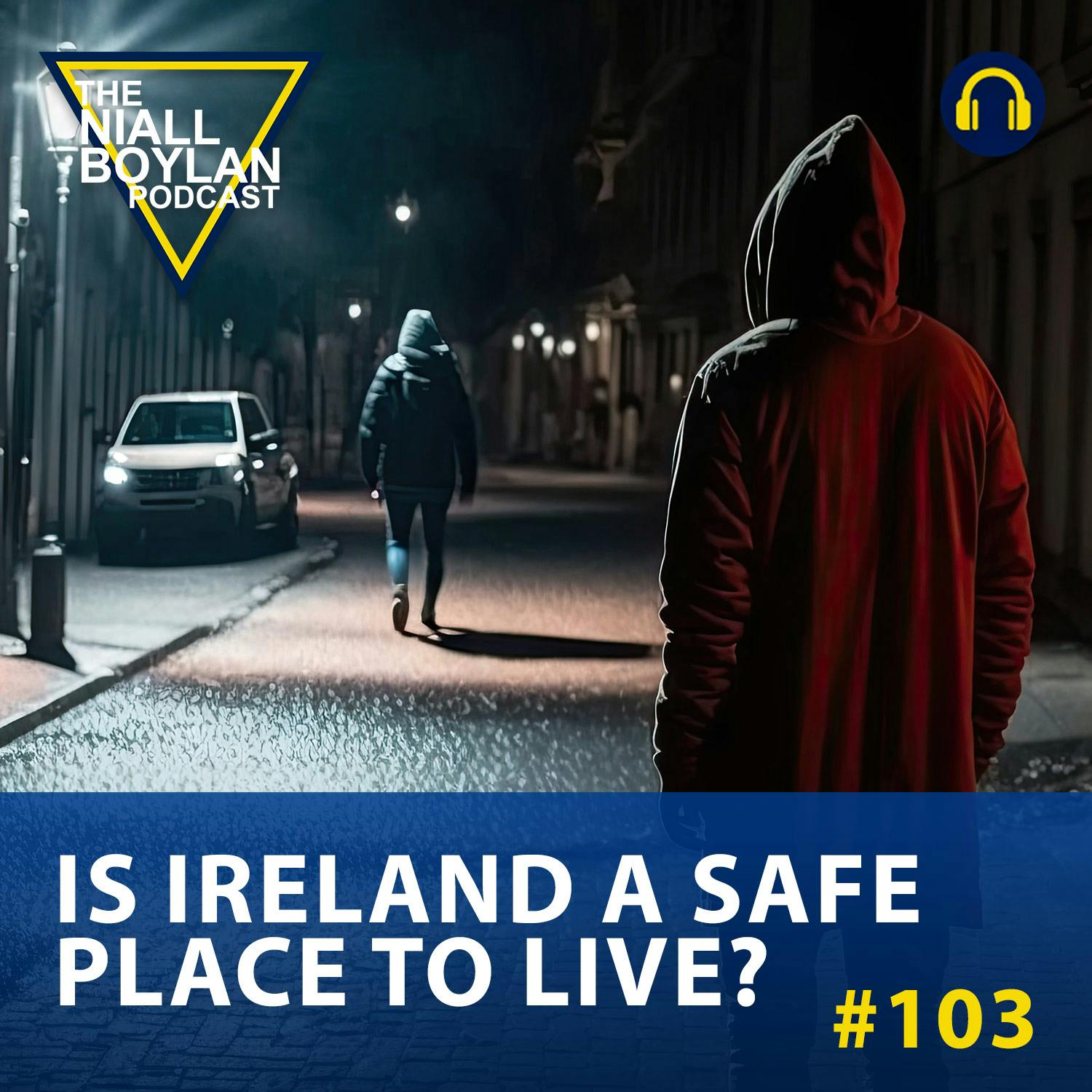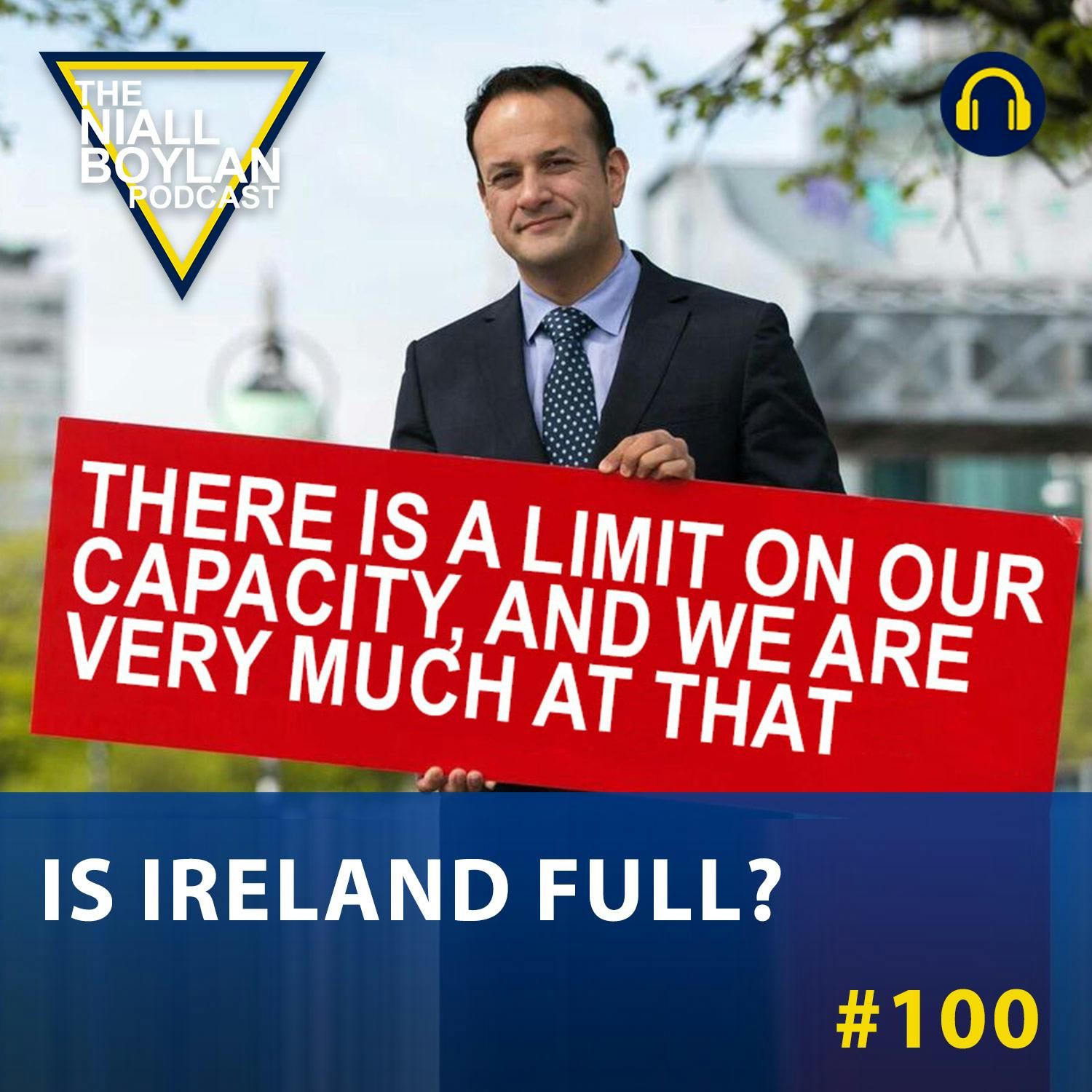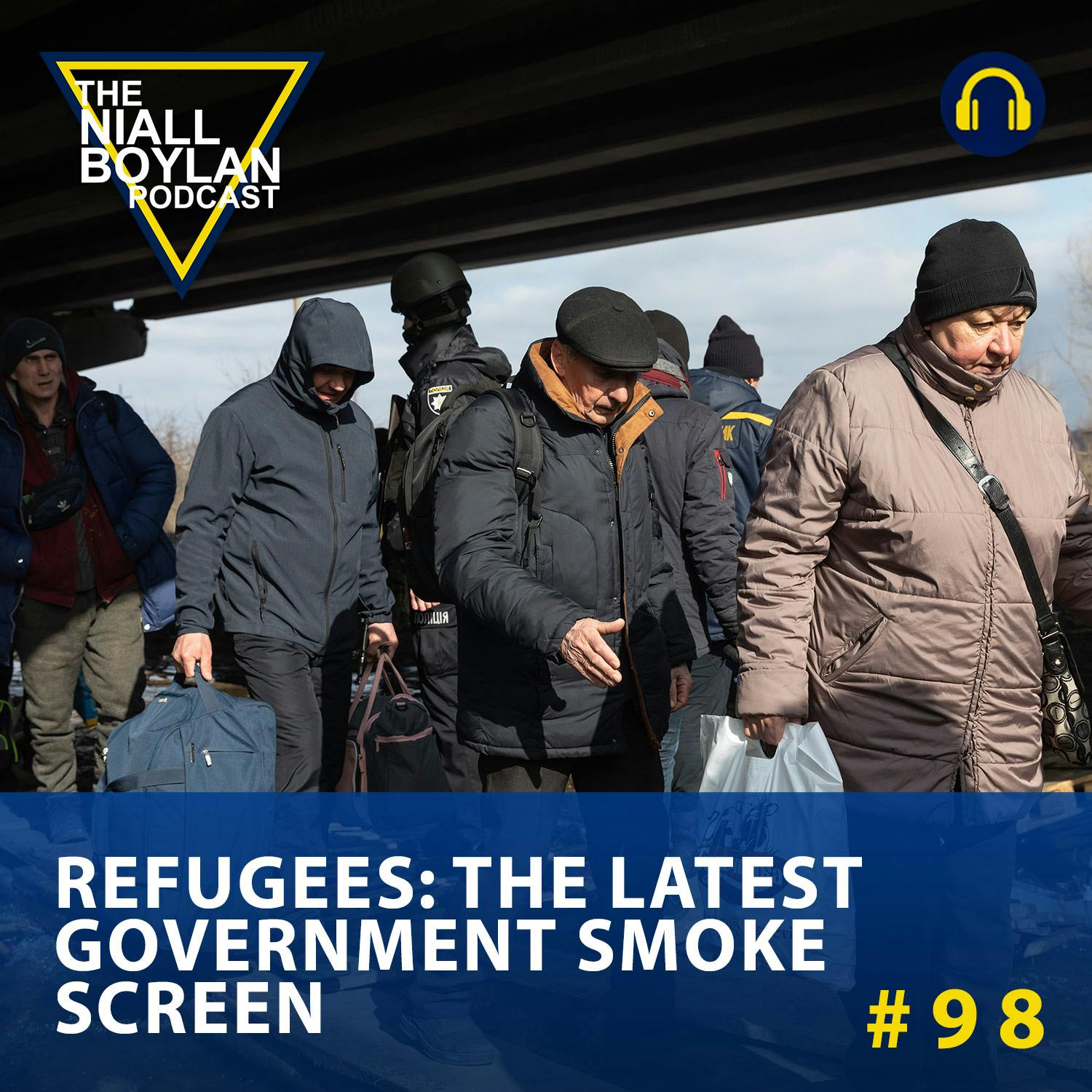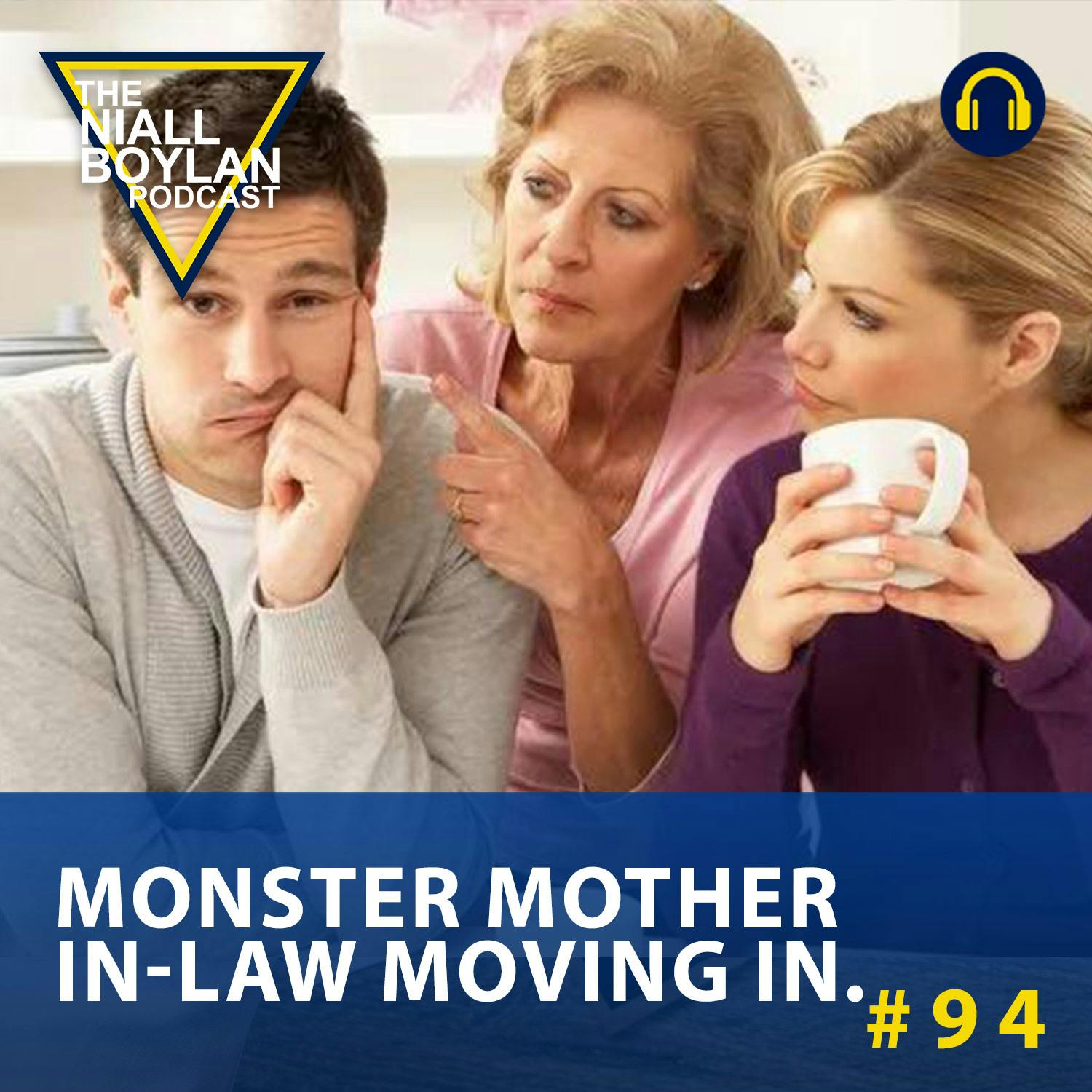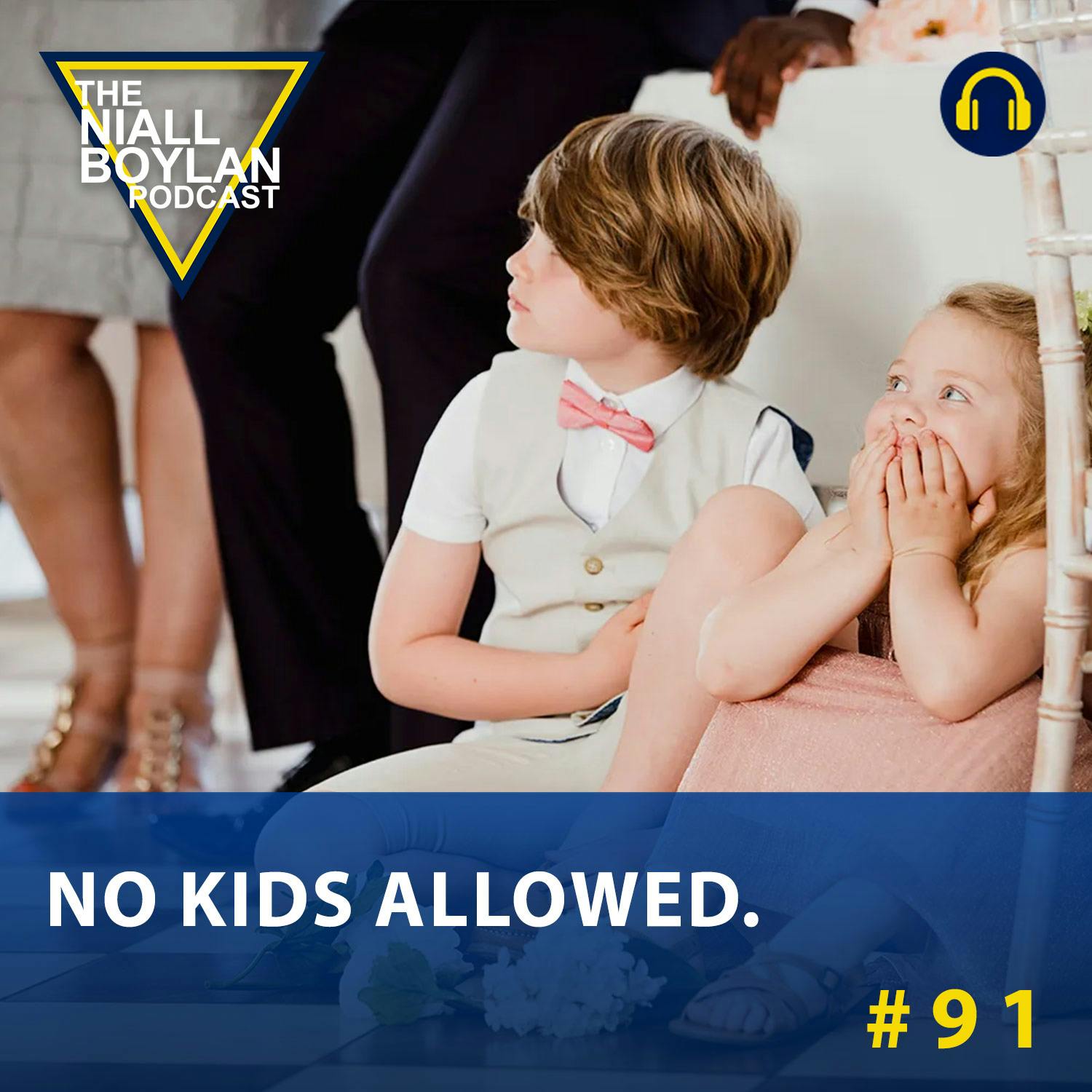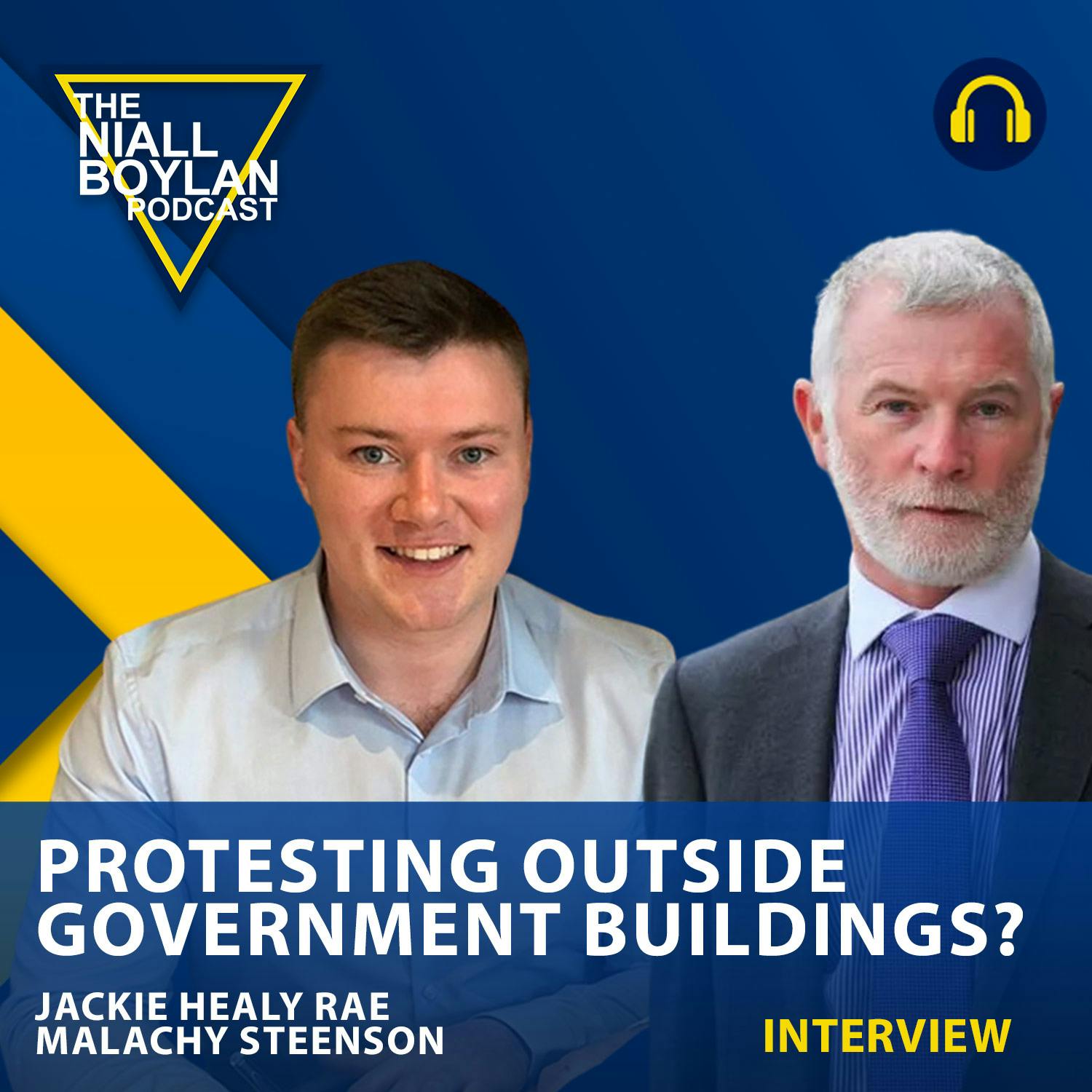Discover The Niall Boylan Podcast (They Told Me To Shut Up)
The Niall Boylan Podcast (They Told Me To Shut Up)

The Niall Boylan Podcast (They Told Me To Shut Up)
Author: Niall Boylan
Subscribed: 216Played: 17,769Subscribe
Share
© Copyright The Niall Boylan Podcast
Description
Niall Boylan is online, and nobody can hold him back. Subscribe to The Niall Boylan Show and access premium content by visiting https://niallboylan.com
296 Episodes
Reverse
In this episode, Niall delves into a pressing question: "Would You Trust All Gardaí With Firearms?" The topic surfaces in the aftermath of a violent knife attack in Dublin and subsequent riots, sparking a debate on whether arming the Gardaí is a solution to escalating crime. Niall provides context through an article highlighting Taoiseach Leo Varadkar's stance on the matter.The podcast explores the recent surge in violent crimes across Ireland, leading to concerns about public safety. Niall presents both sides of the argument by opening the lines to callers who express diverse perspectives on arming the Gardaí.Some callers advocate for arming all Gardaí, emphasizing the need for law enforcement to have the necessary tools to combat rising criminal activity. They argue that increased violence on the streets demands a proactive approach to public safety and crime prevention.On the opposing side, other callers caution against arming all Gardaí, citing potential risks and complications. Concerns about officer training, community policing, and the possibility of escalating violence are discussed. Some suggest alternative solutions such as better technology, intelligence gathering, and strategic investments in law enforcement.As the conversation unfolds, Niall synthesizes the various viewpoints presented by callers and offers his insights. In wrapping up the episode, he encourages continued dialogue on the complex issue of arming law enforcement, emphasizing the importance of finding holistic solutions that prioritize public safety.
In this thought-provoking episode, Niall tackles the critical question: Can You Generally Trust The Media? The discussion is sparked by a recent study published by the Institute for Strategic Dialogue (ISD), revealing the growing influence of the far-right in Ireland and the challenges posed by online platforms in enforcing community guidelines.The study, conducted over the course of a year, analyzed more than 13 million posts across various social media platforms, exposing alarming trends of misinformation, particularly around topics like Covid-19, vaccines, anti-lockdown protests, and LGBTQ+ issues. As the far-right gains traction, questions about media reliability and bias come to the forefront.Niall delves into the dichotomy between social media platforms and mainstream media, questioning whether the latter is a more trustworthy source. He explores the influence of government narratives on mainstream media outlets, referencing statements made during a recent high-profile murder case that implicated government policies in the tragic incident.Opening up the lines to callers, the audience passionately shares their perspectives on media trustworthiness. Some express disillusionment with the media, citing biased reporting, sensationalism, and a lack of accountability. Others, however, defend reputable sources and emphasize the importance of distinguishing between responsible journalism and misinformation.As the episode unfolds, Niall expertly navigates diverse viewpoints, offering listeners a comprehensive examination of the challenges and complexities surrounding media trust. The conversation serves as a reminder of the critical role media plays in shaping public opinion and the necessity of fostering transparency, accountability, and reliability in the realm of information dissemination.
In this deeply moving and emotionally charged episode, Niall compassionately delves into the tumultuous waters of a listener's life-altering predicament. The listener, burdened by a grave secret, unveils a painful narrative of betrayal involving a brother's wife. The raw honesty of the email sets the stage for a profound exploration of morality, family dynamics, and the weight of silence.The complexities of the situation unfold as Niall opens the lines to callers, inviting them to share their perspectives on this tangled web of relationships. The dichotomy between advocating for transparency and grappling with the potential fallout of revealing a harsh truth sparks a riveting and thought-provoking dialogue.Listeners are drawn into the intricacies of familial loyalty, ethical considerations, and the daunting choice between preserving family unity and seeking personal redemption. As the discussion unfolds, Niall skillfully navigates through diverse viewpoints, offering solace and guidance to the distressed listener grappling with an unbearable burden.Join this poignant conversation as it explores the profound impact of infidelity, the moral obligations of honesty, and the delicate balance between personal guilt and the preservation of family bonds. This episode is not just an exploration of a listener's dilemma but a reflective journey into the very fabric of human relationships.
In this emotionally charged episode, Niall tackles a gripping question: Would You Report Your Own Child For Selling Drugs? The discussion stems from a recent news article recounting a mother's anguishing choice to alert the Gardaí about her son's substantial cannabis stash.Senior counsel Tom Creed pleads for leniency, highlighting the young man's efforts to turn his life around. Judge Dara Hayes acknowledges the mother's pivotal role in potentially saving her son from a perilous path.The news article unfolds a harrowing scene where Garda Chris Campbell responds to a desperate call from Margaret Kennelly, fearing for her teenage son's life amid a drug-fueled downward spiral. The discovered €25,500 cannabis stash becomes a focal point in a legal battle that prompts soul-searching questions about privacy, tough love, and the complex dynamics of familial bonds.As Niall opens the lines, callers share a spectrum of views. Some empathize with the mother, recognizing the severity of drug issues but questioning the invasion of privacy. They advocate for addressing societal problems contributing to drug abuse. Others argue that tough choices, like reporting a child, are sometimes necessary to prevent tragedy, emphasizing personal responsibility.Join the conversation as this episode delves into the delicate balance between parental duty, privacy concerns, and the stark realities families confront in the face of drug-related challenges.
Guest: MIchael Collins TD and leader of the Independent PartyIn this insightful episode, Niall explores the question: "Is Immigration An Election Issue?" With the upcoming local elections looming and a possible general election on the horizon, the disconnect between political parties and the public's concerns takes center stage. Recent statements from political figures, including a labor TD dismissing immigration as a crucial election issue, highlight the growing detachment.The evolving stance of Fine Gael, acknowledging concerns about Ireland's capacity for refugees, contrasts with the majority sentiment revealed in a Red Sea poll, where over 75% of Irish citizens feel the country has accepted too many refugees. This raises questions about the government's responsiveness to public opinion and the potential impact on voter trust.Niall delves into the blurred distinctions between Fianna Fáil and Fine Gael, with Sinn Féin focusing on housing and facing criticism for its proposals. Other parties, such as Labour and the Green Party, present ambitious plans, while smaller parties gain traction. The episode analyzes the election landscape, spotlighting key issues like health, housing, immigration, education, childcare, and the cost of living.Opening up the lines, Niall invites diverse perspectives from callers. Some argue that immigration should be a top election issue, emphasizing the strain on essential services and the need to prioritize citizens. Others contend that immigration is crucial for growth, diversity, and economic benefits, with immigrants contributing significantly to the workforce.Niall wraps up the episode, leaving listeners to reflect on the pivotal role immigration plays in shaping political decisions and the future direction of the country.
In this episode, Niall delves into a pressing question: "Is Ireland A Safe Place To Live?" The conversation is prompted by the recent introduction of new criminal offenses and tougher sentences in Ireland. The host refers to a press release from the Department of Justice, highlighting key changes aimed at addressing violent crime, safeguarding emergency service workers, and supporting victims of domestic, sexual, and gender-based violence.Niall begins the discussion by expressing skepticism about the government's claim of building "stronger, safer communities." He raises concerns about the country's focus on legislation against offensive language while street crime rates continue to rise, leading to a growing sense of insecurity among the population.As Niall opens the lines to callers, diverse opinions surface:Some callers are critical of the government's priorities. They argue that while new legislation and tougher sentences are essential, addressing the surge in street crime and the community's fear should be the primary focus. The government is spending too much time on "hurty words legislation" and not enough on tackling real safety concerns.Others believe that supporting law enforcement and introducing tougher sentencing is vital for community safety. They contend that it's not an either-or situation and that the police force requires both legislative support and practical resources. They emphasize that these new laws can act as a powerful deterrent against criminals and deserve commendation.Niall wraps up the episode, emphasizing the importance of considering both legislative measures and practical on-ground actions in ensuring the safety and well-being of Irish communities.
In this thought-provoking episode, Niall delves into the contentious question: "Is Ireland full?" The discussion is ignited by the recent backtrack from Taoiseach Leo Varadkar, who now aims to slow down the number of refugees arriving in Ireland due to accommodation capacity issues.In a private Fine Gael parliamentary party meeting, Varadkar highlighted concerns about the country's accommodation capacity and the growing influx of refugees, particularly Ukrainians. He noted that Ireland's generous offerings of social welfare and accommodation had become a magnet for those who had spent time in other EU countries.Niall opens up the lines to callers, reflecting the diverse viewpoints on this complex issue. Some callers express their frustration at the perceived hypocrisy, citing past instances where concerns about capacity were dismissed as right-wing or racist. They argue that Ireland must prioritize its own citizens, especially given the ongoing housing crisis. These callers stress the need for a more balanced approach that focuses on addressing existing challenges before accepting more refugees.Other callers emphasize Ireland's history of compassion and the importance of upholding these values. They argue that the country has the capacity to accommodate refugees and should continue to provide shelter and support to those fleeing conflict. These callers believe that Ireland can find a balance between addressing housing issues and extending a compassionate hand to those in need.Join the conversation as Niall navigates the complexities of this issue, offering a platform for a nuanced and empathetic discussion about Ireland's role in the global refugee crisis.
In this explosive episode, Niall dives into a contentious issue in Ireland's housing crisis by addressing the question, "Can beggars be choosers?" This topic stems from a heartfelt email sent by a listener, offering a glimpse into the struggles faced by families living in temporary accommodations.The listener's email details the challenges of living in cramped and inadequate housing with her child and the additional burden of her husband's unemployment due to mental health issues. She expresses her frustrations with housing offers she's received and her longing for a stable, family-friendly home near her mother.Niall opens the phone lines, allowing callers to weigh in on this dilemma. Some callers empathize with the listener's predicament, highlighting the need for more personalized, family-oriented housing solutions. They argue that people in difficult situations should not be compelled to accept unsuitable offers.On the other hand, some callers believe that the listener's expectations are unreasonable. They assert that she should be grateful for any assistance provided and that personal responsibility plays a significant role in overcoming hardship.Don't miss this compelling conversation about the challenges and complexities of Ireland's housing crisis, as Niall engages with callers sharing diverse perspectives on this pressing issue.
In this episode, Niall delves into a recent controversy surrounding the accommodation of refugees fleeing Ukraine in Ireland. A proposed new approach, which suggests that Ukrainian refugees should be accommodated for only 90 days before being sent to the private sector, has ignited a heated debate.This topic arose from a recent article in The Irish Times, which unveiled a significant rift within the Irish government. The cabinet witnessed what's been described as "the most divisive, heated discussion" among ministers since the formation of the coalition.Minister for Integration, Roderic O’Gorman, presented a new approach to accommodating Ukrainian refugees, arguing that the current system was unsustainable and would lead to people being left on the streets. The proposal suggested that refugees should be housed for only 90 days before being moved to the private sector.Tánaiste Micheál Martin raised concerns that this would essentially shift the responsibility to the Department of Housing, which would have to provide housing and homelessness services after 90 days. Similar concerns were echoed by Minister for Housing, Darragh O’Brien.Government sources also mentioned plans to establish "five or six" major centers for Ukrainians across the country and gradually phase out the use of hotels. Disagreement persisted over the idea that refugees would be asked to leave these temporary centers after 90 days.There was also debate about the high social welfare rates in Ireland possibly acting as a magnet for Ukrainian refugees.The discussion escalates as Niall opens the lines to callers. Some believe that this is a smoke screen, asserting that the 90-day restriction is merely a technicality, as refugees would still receive benefits. These callers argue that the government should prioritize Irish citizens who are homeless and struggling to make ends meet.On the other hand, some callers contend that turning away those fleeing war and seeking safety is not an option. They believe that Ukrainian refugees should be given a chance to work and rebuild their lives. These callers argue that helping refugees and supporting vulnerable Irish citizens are not mutually exclusive.Join the conversation as Niall wraps up this contentious debate, examining the complexities of this humanitarian issue that has divided opinions across the nation.[bwl_poll id= "5876" /]
In this episode, Niall tackles a hotly debated issue: Has Sex Education (SPHE) in schools gone too far? Particularly, does it cross boundaries when discussing topics like multiple genders, transgender issues, and various aspects of sexuality? The catalyst for this discussion is the upcoming sex education curriculum for Junior Cycle students, which requires them to appreciate how "sexual orientation and gender identity are experienced and expressed in diverse ways."The curriculum specification for the new SPHE (Social, Personal, and Health Education) program is set to be published soon, with plans for it to be introduced in schools from the next academic year. This curriculum overhaul follows a Government-commissioned review of sex education at the primary and secondary levels. The review found that the existing 20-year-old syllabus was outdated, overly focused on biology, and failed to address the realities of young people's lives or LGBTQ issues.Teaching on gender identity within the curriculum has sparked significant controversy, especially among some Catholic groups, who accuse policymakers of promoting a "new gender self-identity doctrine."Niall opens up the lines for callers to share their thoughts.Some callers believe that education should evolve to reflect the realities of young people's lives. They support the new curriculum as a progressive and inclusive step towards creating a more accepting and tolerant society. They emphasize the importance of teaching kids about diversity and fostering respect for all, regardless of sexual orientation or gender identity. They argue that the world has changed, and young people today are more aware of these topics. It is essential to provide them with accurate information and help them understand and respect the experiences of their LGBTQ peers.Others express concerns about the new sex education curriculum. They feel it's introducing complex topics to children at too young an age. They believe that kids should focus on traditional values and academics. They are worried that the curriculum is pushing an agenda and potentially confusing children. They emphasize that children should be allowed to be kids and not be exposed to these sensitive subjects. They argue that it is the parents' responsibility to educate their children on these matters when they believe the time is right, rather than leaving it to the schools.Join the conversation to explore the ever-evolving role of sex education in schools, where it stands in today's society, and the fine line it walks.Niall wraps up the show by summarizing the key points discussed and the need to appreciate diverse perspectives on this complex issue.
In this episode, Niall dives into a sensitive and complex topic that raises questions about the boundaries of love, care, and vulnerability. The focus is on a concerned mother who reached out via email, highlighting her teenage daughter's situation.The mother describes her daughter, almost 18, who lives with moderate to severe autism. Her daughter's condition comes with unique challenges, including intermittent meltdowns and unpredictable behavior. While she has moments of stability, her cognitive and social maturity are notably behind her chronological age, estimating her social age to be around 13 or 14, or even younger during episodes.Niall opens the lines to callers as they grapple with the question: Would you allow your 17-year-old daughter with autism to date someone who is not on the spectrum?The responses vary widely. Some callers argue for an open-minded approach, emphasizing that love should know no boundaries. They believe that, like any teenager, individuals with autism have the right to explore romantic relationships. In this situation, the boyfriend appears caring and genuine, showing affection towards the young lady. They argue that her happiness and emotional development should be nurtured, just as any teenager's.In contrast, others find the situation deeply concerning and inappropriate. They highlight the age gap – a 25-year-old dating a 17-year-old – especially given the young lady's autism spectrum condition. They raise concerns about potential manipulation and exploitation, emphasizing the need to protect her, given her vulnerability. In their view, it's not just about love; it's about safeguarding her emotional and psychological well-being.The complexity of this situation raises important questions about consent, protection, and the role of parents in guiding their children towards safe and fulfilling relationships. This discussion delves into the intricate balance between fostering independence, protecting vulnerable individuals, and ensuring their well-being.Join this deeply empathetic and thought-provoking conversation that delves into the challenges of navigating dating and relationships within the realm of disabilities. It's a careful examination of love, care, and personal boundaries, and it may reshape your perspective on what it means to support someone with unique needs.Don't miss this engaging episode, where Niall and his callers explore the multifaceted aspects of dating with disabilities, offering valuable insights for both parents and individuals dealing with similar dilemmas.
In this episode, Niall dives headfirst into a contentious debate: "Do You Think the Police Are Tough Enough on Crime?" The discussion explores whether law enforcement's approach to tackling criminals has become too soft or is adequately robust. The conversation is sparked by recent events in Germany, where police have controversially employed the "pain grip" to disperse protesters, igniting a global conversation about the balance between maintaining order and respecting individual rights.As Niall opens up the phone lines, the conversation quickly reveals a diverse array of opinions from callers.Some passionately argue that being tough on criminals and unruly protesters is a necessary and effective approach. They assert that individuals need to understand that their actions have consequences, and law enforcement plays a vital role in ensuring that order is maintained in society. The "pain grip," they argue, sends a clear message that lawlessness won't be tolerated, and this assertive stance is essential for the protection of law-abiding citizens. For these callers, they believe that police should be more heavy-handed, as it's often the only language that certain individuals understand.On the other side of the spectrum, there are callers who express concern over excessive force. They stress the importance of holding law enforcement accountable for their actions and assert that force should be a last resort. The controversial "pain grip" raises questions about whether it is a proportionate and humane response. These callers advocate for restraint in using such measures, if at all. They believe that the focus should be on ensuring that the criminal justice system is fair, transparent, and efficient. For them, the severity of the consequences for criminal actions can act as a powerful deterrent, making potential wrongdoers think twice before breaking the law.Niall skillfully navigates this emotionally charged and complex discussion, allowing listeners to explore the intricacies of policing, civil rights, and the challenging balance between maintaining order and protecting individual liberties.Join Niall and the callers as they delve into this thought-provoking conversation, shedding light on the nuanced and multifaceted issue of police conduct and its implications for society.
In this episode, Niall delves into the intricate and often emotional topic of "Would You Allow Your Monster Mother-In-Law to Move In?" This engaging discussion arises from a heartfelt email sent in by a listener, highlighting a dilemma faced by many families.The listener's email shares a personal story that many can relate to. It speaks of the challenges and dilemmas surrounding an aging mother-in-law, referred to humorously as a "monster," who is in need of care and a place to stay. The email underscores the love and respect for this woman who has played a significant role in her daughter's life. At the same time, it details the tensions, frustrations, and intrusions experienced in a household when the mother-in-law moves in. The listener's email opens a Pandora's box of questions about family, caregiving, boundaries, and the intricacies of intergenerational relationships.As Niall opens up the phone lines, the callers present a wide range of perspectives on this complex issue. Some passionately argue in favor of compassion and familial responsibility, emphasizing the importance of caring for loved ones in their later years, especially when it comes to a mother-in-law who played a significant role in raising their spouse. These callers highlight the financial and emotional benefits of accommodating the mother-in-law, citing the strengthening of family bonds as a significant advantage. In the spirit of finding middle ground, they suggest possible solutions, such as creating separate living spaces to ensure privacy and minimize interference. For them, communication and setting clear boundaries are the keys to making this arrangement work.However, there are contrasting views presented by others who've had firsthand experience with difficult in-law situations. They express concerns about the potential disruptions, tensions, and interferences that can arise when a "monster" mother-in-law moves in. These callers advocate for considering alternative care options like nursing homes, emphasizing that this approach can provide proper care for the elderly while maintaining the peace and well-being of the core family unit. They highlight the significant strain that an intrusive mother-in-law can put on a marriage, making it crucial to explore alternatives to protect the family's unity and harmony.Niall guides the conversation through this emotionally charged topic, helping listeners navigate the complexities of balancing familial responsibilities, individual boundaries, and the broader dynamics of family life.Join Niall and the callers in this engaging and thought-provoking discussion as they weigh the pros and cons of allowing a "monster" mother-in-law to move in and explore the multifaceted landscape of family relationships.Niall Wraps Up:In conclusion, the discussion around whether or not to allow a "monster" mother-in-law to move in is a deeply personal and emotionally charged one. It's clear that there are valid arguments on both sides, with no one-size-fits-all solution. The importance of open and honest communication within the family cannot be overstated. Setting clear boundaries and expectations is key to making such an arrangement work.Ultimately, it's a decision that involves considering the well-being of the elderly parent, the stability of the marriage, and the overall harmony of the family. It's a delicate balancing act, and there are no easy answers. Families facing such a dilemma should weigh the pros and cons carefully, explore alternative care options, and seek professional advice when needed.The conversation has shed light on the complexities of family relationships and the challenges many face when dealing with caregiving responsibilities and boundaries. We hope that the insights shared today will provide guidance to those navigating similar situations.
In this episode, Niall asks the thought-provoking question: Should You Go To Jail For Animal Cruelty? This topic arises from a recent news article detailing the legal consequences for a family's acts of cruelty to animals.Three family members, Mr. Michael Reilly (27), Mr. Martin Reilly Snr (43), and Ms. Katherine Reilly (71), received jail sentences totaling 13 months after pleading guilty to a combined eight charges under the Animal Health and Welfare Act (AHWA) 2013. These charges were in relation to 17 dogs and 10 puppies found in distressing conditions on their property in Co Tipperary.The court heard harrowing details of the dogs' living conditions, which included being chained, housed in a metal cage, cattle trailer, and a corrugated shed. The animals suffered from neglect, lack of clean drinking water, and various health issues.Additionally, the podcast incorporates the case of an 89-year-old woman who was sentenced to 20 months in jail for persistent cruelty to animals. Despite being banned from owning animals, she ignored the order and continued to subject animals to horrifying conditions.Niall opens up the lines to callers, where diverse opinions emerge. Some argue that cruelty to animals is a serious matter that warrants legal consequences, including imprisonment. Others, like Steve, point out the alleged hypocrisy of condemning animal cruelty while consuming meat, raising questions about society's treatment of animals in various contexts.Join the conversation as Niall delves into this challenging issue, exploring different perspectives and their implications.
In this explosive and divisive episode, Niall delves into a pressing question: Should you have a Constitutional Right To A Home? This inquiry arises in the context of an upcoming referendum to vote on Article 39 and 43 of the Irish Constitution. Peter Dooley, an influential figure known for his role as Co-Founder of the Dublin Renters' Union, Co-Founder of the Stop The War Campaign, and Independent Political Candidate, joins Niall to discuss the implications of this critical issue.The episode begins by addressing a newly published study that links private renting to faster biological aging. Researchers from Essex University and Adelaide University have found that the stress associated with renting has a more significant impact on health than experiencing unemployment. This research underscores the potential epigenetic consequences of housing problems and advocates for housing as a target of health interventions.The program for government, jointly agreed upon by Fianna Fáil, Fine Gael, and the Green Party, has committed to holding referendums on housing and extending the franchise to Irish citizens living outside the State. However, progress on a housing referendum has been hindered by disputes over recommendations for constitutional reform. The Housing Commission, responsible for developing options for this referendum, has yet to agree on a final wording or approve its report.The Irish Constitution explicitly protects the right to private property in Article 43 but makes no mention of a right to housing. It recognizes that the right to private property must be regulated in the interests of social justice and permits limitations on this right for the common good. The absence of a constitutional right to housing has sparked debate over the balance between property rights and the common good.Niall opens the lines to callers, resulting in a lively and diverse discussion. Some callers firmly believe that housing should be considered a fundamental right, essential for well-being and dignity. They argue that housing as a constitutional right would ensure equal access to shelter, prevent discrimination, and address homelessness through government policies like affordable housing initiatives and rent controls.In contrast, others contend that while housing is crucial, it should not be enshrined as a constitutional right. They argue that this could have unintended financial consequences and may lead to intergenerational dependence on the state for welfare and housing.As the episode concludes, Niall provides a recap of the main points raised by callers, offering listeners a comprehensive overview of the multifaceted issues surrounding housing rights and the ongoing debate in Ireland.
In this engaging episode, Niall dives headfirst into a conundrum that many couples and families grapple with: Should children be allowed at weddings? The topic takes center stage thanks to a heartfelt email from a listener facing a delicate family dilemma.The episode kicks off with the listener's email, which unveils a challenging situation. The listener, a devoted brother and the best man at his brother's upcoming wedding, is caught in the middle of a family feud. Invitations for the wedding were recently sent out, and to the listener's surprise, the couple explicitly excluded children from the celebration.When the listener approached his wife with this revelation, she was less than pleased. A fervent debate ensued, with his wife staunchly refusing to attend the wedding without their three children. The groom, the listener's brother, is equally adamant that children are not part of the plan due to space constraints and the bride's preference for an adults-only affair.As the tension escalates, the listener grapples with a heart-wrenching dilemma: Who should come first, his wife or his brother? Niall opens the lines to callers from various walks of life, and their diverse perspectives add depth to the discussion.Some callers emphasize the logistical and practical reasons for excluding children from weddings. They highlight the potential chaos, the risk of exposing children to inappropriate behavior, and the overwhelming nature of weddings, which might not be suitable for young ones. They argue that these celebrations should cater primarily to adults and the couple getting married.On the other side of the debate, there are callers who passionately advocate for including children at weddings. They see weddings as opportunities for families to come together, celebrate love, and create lasting memories. Children's presence, they argue, adds an extra layer of joy, innocence, and purity to the occasion. Witnessing young ones' excitement and wonder can make the event even more special.As Niall delves into the nuances of this age-old debate, he explores the delicate balance between honoring family traditions and accommodating the preferences of the couple getting married. Listeners will gain valuable insights into the complex dynamics that weddings can bring to the surface, making this episode a must-listen for anyone navigating the delicate dance between love, family, and celebration.[bwl_poll id= "5696" /]
In this episode, Niall delves deep into a topic that was sparked by an emotionally charged email from a concerned listener. The question he poses is one that resonates with many: "Would You Date A Single Mother?" The listener's email provides a poignant backdrop, sharing the story of her 22-year-old son, a diligent medical student who found himself in an unexpected romantic entanglement with a 32-year-old single mother of three, navigating the complexities of divorce, unemployment, and single parenthood.Niall opens the lines to his callers, and the outpouring of opinions is both passionate and diverse. Some believe that parenthood should never define a person's worthiness as a potential partner. They argue that single mothers often exhibit incredible strength, resilience, and boundless love. Their unique life experiences and perspectives can enrich a relationship, and judging someone solely based on their parental status is overly simplistic.Conversely, other callers bring a different perspective to the table. They stress that it's not about passing judgment; it's about assessing compatibility. Dating a single mother often involves embracing additional responsibilities and commitments, such as navigating complex parenting schedules and offering childcare support. For those without prior experience in parenthood, this can be a daunting prospect, leading them to question whether they are equipped to handle the complexities of such a relationship.In a world where relationships come in all shapes and sizes, Niall encourages his listeners to keep an open mind. Love, after all, has a remarkable ability to transcend labels and circumstances. Through this episode, listeners are invited to reflect on the ever-evolving landscape of modern dating and relationships, where understanding, compassion, and open-heartedness can lead to unexpected and beautiful connections.Niall wraps up the discussion, leaving his audience with plenty to ponder about the multifaceted nature of love and human connection.
In this episode, Niall Boylan dives into the complex and emotionally charged question: Would you give a cheating partner a second chance? This topic hits home for many, as infidelity is unfortunately not uncommon in modern relationships, with statistics showing that a significant percentage experience at least one incident of cheating.As Niall opens up the lines, listeners are treated to a diverse array of perspectives. Some callers firmly believe in the power of forgiveness and redemption within relationships. They argue that people can make mistakes, even grave ones like cheating, but if the partner who strayed is genuinely remorseful, committed to repairing the relationship, and has an otherwise positive track record, second chances can be a path to healing and growth.On the flip side, others hold a different viewpoint. They acknowledge the concept of forgiveness but emphasize the devastating breach of trust that accompanies infidelity. For these callers, cheating goes beyond a momentary lapse; it signifies a pattern of deception and betrayal. Rebuilding trust can be a Herculean task, and, in some cases, the damage proves insurmountable. Many callers firmly believe in the adage, "once a cheater, always a cheater."Join Niall Boylan and his insightful callers in this heartfelt exploration of the intricacies of relationships, forgiveness, and the difficult decision of whether to grant a second chance to a cheating partner. As they share their personal stories and opinions, you'll gain valuable insights into the complexities of love and trust in the modern world.Niall wraps up the discussion, leaving listeners with much to ponder when it comes to the intricacies of love and the delicate balance between forgiveness and self-preservation.
In this riveting interview, Niall Boylan engages in a passionate discussion with two distinguished guests: Jackie Healy Rae, Independent Councillor on Kerry County Council representing the Castleisland Lea, and Malachy Steenson, Solicitor and Campaigner. The topic at hand is the recent wave of protests outside the Dáil and the contentious issue of protest exclusion zones.The conversation delves deep into the heart of the matter, with both guests presenting contrasting viewpoints. Malachy Steenson staunchly defends the people's right to protest when deemed necessary, emphasizing the importance of non-violence as a core principle. He believes that protest exclusion zones may encroach upon citizens' democratic rights and should be approached with caution.Jackie Healy Rae, on the other hand, acknowledges the right to protest but expresses strong concerns about the behavior and language used during recent protests. As an Independent Councillor, he believes that some lines were crossed, and the discourse turned dirty and divisive.The interview showcases the passionate clash of perspectives between these two distinguished guests. Their candid and sometimes heated exchange provides listeners with a profound insight into the complexities of balancing democratic rights, public safety, and responsible protest.Join Niall Boylan, Jackie Healy Rae, and Malachy Steenson in this enlightening conversation that explores the multifaceted issue of protesting outside government buildings. As they navigate the nuances of this topic, you'll gain valuable insights into the challenges of preserving democratic values while maintaining order and civility.
In this episode, Niall Boylan dives deep into a pressing question: Should citizens be allowed to protest outside government buildings? This question has gained prominence following a recent protest outside the Dáil, during which protesters grew increasingly angry. As a result, politicians have raised concerns about the need for protest exclusion zones and even the involvement of the Defence Forces due to rising levels of vitriolic and extreme abuse.The topic of protesters' rights and politicians' safety is a complex and highly relevant issue. Political parties and groups have submitted various recommendations to a new taskforce on politicians' safety, proposing measures such as exclusion zones around Leinster House, dedicated units for reporting threats, notification systems for protests, and enhanced security measures.Callers join Niall in this engaging conversation, sharing their diverse perspectives on this matter. Some argue that protest exclusion zones are essential for ensuring the safety and security of politicians, government employees, and the democratic process itself. They contend that while the right to protest is fundamental, it should not infringe upon the safety and privacy of elected representatives.On the other side of the debate, some callers emphasize the importance of safeguarding freedom of expression and the right to protest as core principles of democracy. They express concerns that exclusion zones may restrict these rights and discourage public dissent and civic engagement.Niall provides a platform for these contrasting views, allowing callers to explore the delicate balance between safety and democracy. The discussion highlights the complexities of this issue and its broader implications for democratic societies.Join Niall Boylan and his callers as they delve into this multifaceted topic, offering valuable insights into the challenges of protecting politicians while upholding democratic values.Niall wraps up the conversation, leaving listeners with much to ponder about the intersection of protest rights and political safety in the modern world.






